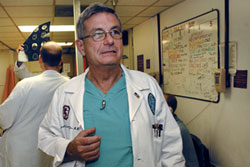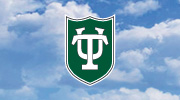Care in the line of fire
Combat situations require basic skills for treating trauma — as well as skills to keep yourself and the patient out of harm’s way.
 |
| Dr. Norman McSwain is an expert in prehospital trauma life-support training. He led doctors and medics from 10 Latin American countries through rigorous scenarios. (Photo by Rick Olivier) |
Dr. Norman McSwain pioneered the development of pre-hospital trauma life-support training in 1981, literally writing the textbook on the subject. The book is now in the seventh edition and translated into 11 languages. Since that time, about 700,000 emergency medical technicians in 55 countries have been trained to care for injured persons until they can receive hospital care.
In 2011, McSwain traveled to Ecuador to lead doctors and medics from 10 Latin American countries in tactical combat casualty care training. These trainees, in turn, will relay the skills to front-line caregivers who, according to McSwain, "have to take care of wounded patients while the bad guys are still shooting at them."
McSwain adapted the curriculum to the specific needs of the Latin American countries, including Mexico, where combat situations might include bank robberies, battles with drug lords and hostage situations, events that McSwain says are "far more common events than we think about in the United States."
Combat situations, says McSwain, require basic skills for treating trauma but also require specific considerations, such as knowing how to quickly put a tourniquet on yourself while caring for the wounded. |



